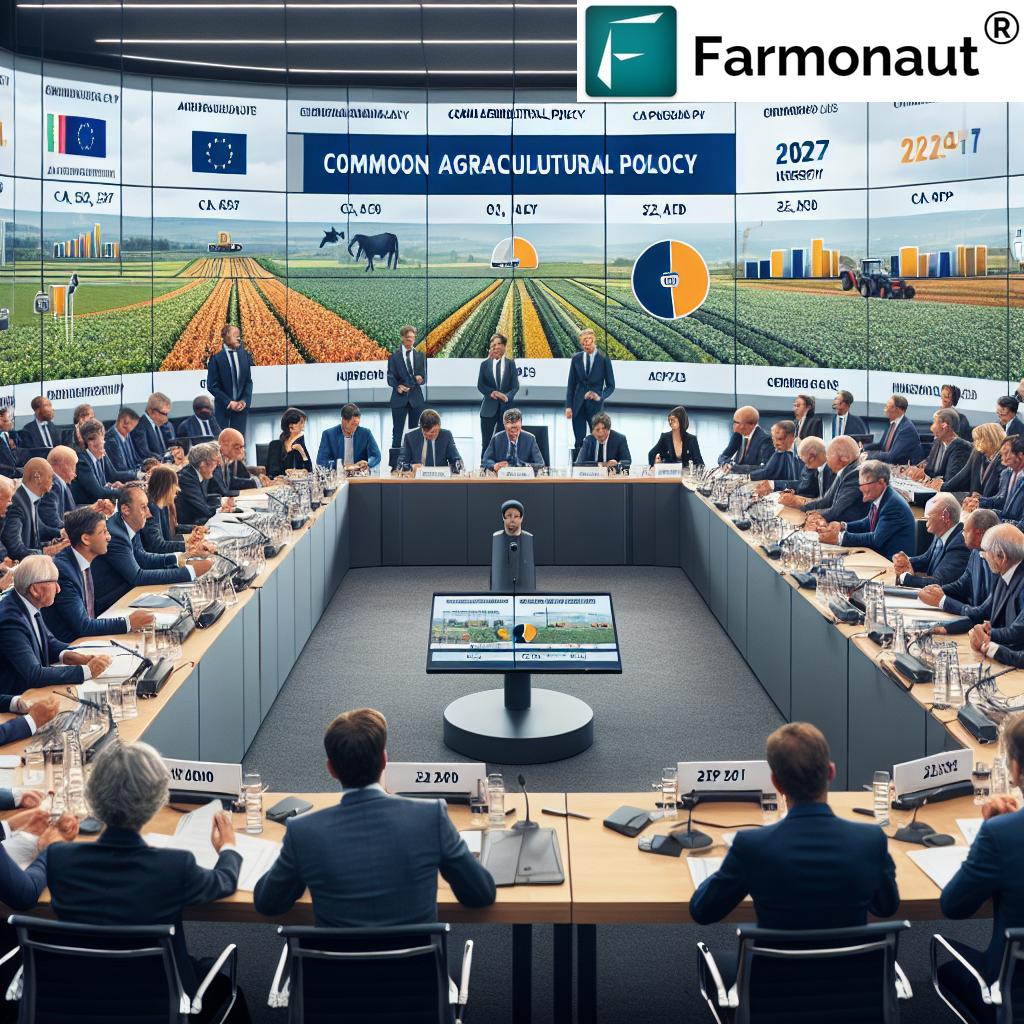Unlocking the Future: Slovenia’s Bold Move in EU’s Post-2027 Agricultural Revolution
Luxembourg, 22 October (STA) – In a landmark meeting that promises to reshape the future of European agriculture, EU ministers responsible for agriculture, including Slovenia’s Mateja Čalušić, have endorsed crucial resolutions on the Common Agricultural Policy (CAP) after 2027. This pivotal gathering in Luxembourg marks a significant step in the European farm policy evolution, setting the stage for a transformative era in EU agriculture policy.

Slovenia’s Agricultural Future: A Bold Vision
At the heart of these discussions was Slovenia’s agriculture minister, Mateja Čalušić, whose contributions to the Luxembourg agriculture meeting have been pivotal. Čalušić’s engagement in the talks not only highlights Slovenia’s commitment to shaping the EU CAP 2027 and beyond but also underscores the country’s proactive stance in steering Slovenia’s agricultural future.
During the meeting, Čalušić emphasized the importance of sustainable farming practices and technological innovation in agriculture. She stated, “Our vision for Slovenia’s agriculture is one that embraces both tradition and innovation. We are committed to implementing Mateja Čalušić CAP reforms that will ensure our farmers are equipped for the challenges of tomorrow.”
For those interested in staying updated on agricultural innovations, the Farmonaut app offers cutting-edge solutions for modern farming:
Key Outcomes of the Luxembourg Agriculture Meeting
The Luxembourg agriculture meeting outcomes represent a significant leap forward in shaping the Common Agricultural Policy future. Here are the key resolutions adopted:
- Enhanced focus on sustainable farming practices
- Increased support for young farmers and rural development
- Integration of digital technologies in agricultural processes
- Strengthening of farm-to-fork supply chains
- Improved measures for climate change adaptation and mitigation
These agricultural resolutions lay the groundwork for a more resilient and sustainable agricultural sector across the EU, with particular emphasis on adapting to climate change and embracing technological advancements.
The Role of European Commissioner for Agriculture
A crucial aspect of the meeting was Čalušić’s interaction with Janusz Wojciechowski, the European Commissioner for Agriculture. Their discussions centered on aligning Slovenia’s agricultural goals with broader EU objectives, particularly concerning the Common Agricultural Policy post-2027.
Wojciechowski praised the collaborative spirit of the meeting, stating, “The resolutions adopted today reflect our collective commitment to a sustainable and prosperous agricultural future for Europe. The input from member states, including Slovenia’s valuable contributions, will be instrumental in shaping our EU farm policy for years to come.”

Implications for EU Agriculture Policy
The EU agriculture ministers’ resolutions set forth a vision for a more dynamic and adaptable agricultural sector. Key aspects include:
- Technological Integration: Emphasis on integrating smart farming technologies and precision agriculture.
- Environmental Sustainability: Increased focus on biodiversity and reducing the environmental footprint of farming practices.
- Rural Development: Enhanced measures to support rural communities and prevent depopulation.
- Market Resilience: Strategies to improve the sector’s ability to withstand market shocks and global challenges.
For farmers looking to leverage technology in their operations, Farmonaut’s API offers valuable tools and data. Developers can explore the API documentation for integration details.
Slovenia’s Pioneering Approach
Slovenia’s approach to the CAP after 2027 is characterized by its focus on:
- Promoting organic farming and sustainable agricultural practices
- Investing in agricultural education and research
- Supporting small and medium-sized farms
- Enhancing the competitiveness of Slovenian agricultural products in the EU market
Čalušić elaborated on Slovenia’s strategy: “Our goal is to position Slovenia as a leader in sustainable and innovative agriculture. We’re committed to supporting our farmers in adopting new technologies and practices that will make our agricultural sector more resilient and competitive.”
The Road Ahead: Implementing CAP Reforms
As the EU moves towards implementing these Mateja Čalušić CAP reforms, several challenges and opportunities lie ahead:
- Balancing Tradition and Innovation: Finding ways to preserve traditional farming methods while embracing new technologies.
- Climate Change Adaptation: Developing strategies to help farmers cope with changing climate patterns.
- Digital Transformation: Ensuring widespread adoption of digital tools and technologies across the agricultural sector.
- Market Access: Improving access to markets for small and medium-sized farms.
To stay informed about the latest in agricultural technology and practices, farmers can download the Farmonaut app:
Conclusion: A New Era for European Agriculture
The Luxembourg agriculture meeting and its outcomes mark the beginning of a new chapter in European agriculture. With Slovenia playing a pivotal role, the EU CAP 2027 and beyond is set to usher in an era of sustainable, technologically advanced, and resilient farming practices across the continent.
As the EU prepares to implement these far-reaching reforms, the agricultural sector stands on the brink of a transformation that promises to benefit farmers, consumers, and the environment alike. The collaborative efforts of EU member states, exemplified by Slovenia’s proactive approach, paint a promising picture for the future of European agriculture.
The journey towards implementing these reforms will undoubtedly be complex, but with continued cooperation and innovation, the EU’s agricultural sector is poised to meet the challenges of the 21st century head-on, ensuring food security, environmental sustainability, and rural prosperity for generations to come.















